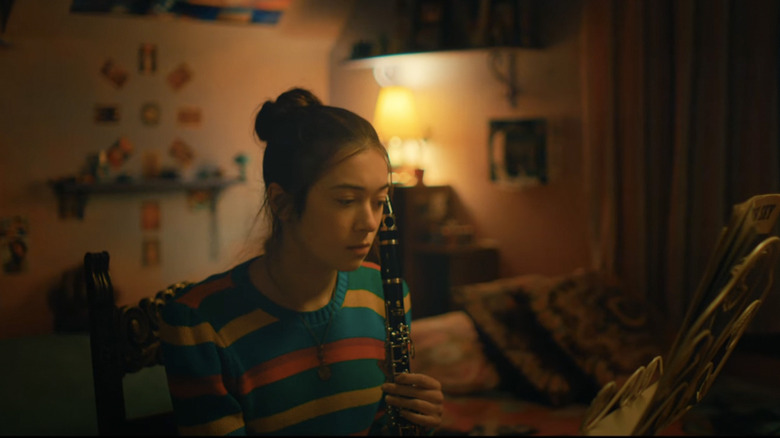
Josephine Decker ("Shirley," "Madeline's Madeline") has been making feature films since 2008, and has always been interested in exploring intense emotional states and raw, exposed feelings with a mixture of intensity and whimsy. In addition to making adorable short films like "Me, The Terrible," about a young girl going on an imaginary pirate adventure in the big city, Decker also once attended Marina Abramović's exhibition "The Artist is Present" and was escorted from the building for undressing in front of the artist. Two of Decker's features and several of her shorts are currently available on The Criterion Channel.
In Decker's new film, "The Sky is Everywhere" -- based on the novel of the same name by Jandy Nelson, who also wrote the screenplay -- actress Grace Kaufman plays a 17-year-old musician named Lennie, who, on the cusp of auditioning for Julliard, is blindsided by the sudden death of her sister, Bailey (Havana Rose Liu), caused by a surprise medical condition. The film follows Lennie's grieving process as she navigates her newfound emptiness, her relationships with her free-spirit grandmother (Cherry Jones), her stoner uncle (Jason Segal), as well as a few potential romances. "The Sky is Everywhere" is decidedly less confrontational than some of Decker's previous works, and yet still captures the unbreakable presence of artistic passion, even in times of grief.
On the eve of the film's release, /Film spoke with Decker about "The Sky is Everywhere," the allure of redwood forests, and her work in general.
A Happy And Fun Movie About Grief
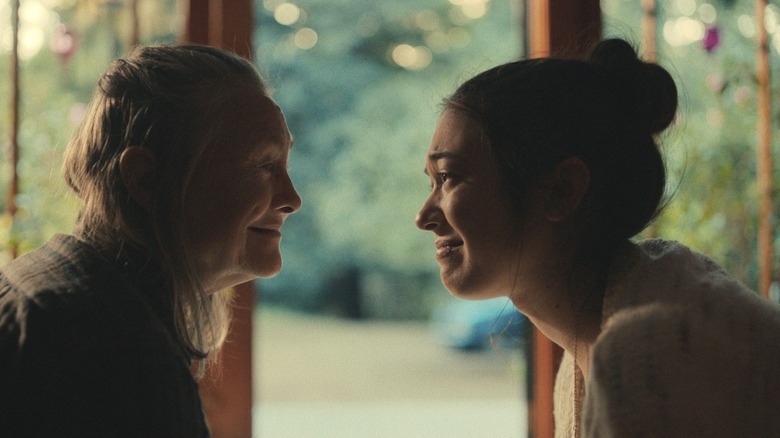
One of the things I liked about "The Sky is Everywhere" is that the different characters grieve in different ways, and how there's no real template for grief. There are many stories out in the media right now about grief. What drew you to a story about grieving?
It's funny, because when I first read the script, I was like, "What a playful, happy fun movie! I really want to do a fun, happy, comedy." I was like, "I'm going to do this fun movie, Mom." She's like, "What's it about?" I'm like, "It's about grief." I was like, "Wait." The most miraculous thing that Jandy [Nelson], our writer, pulled off: She wrote a beautiful script that's very joyous and affirming, but that is about grief. I think it was like a magic trick in a way, but also feels very authentic and true, especially to the life of a teenager.
It's easy to get swallowed up in one emotion, but I feel like there's also this thing about being a teenager where you're swinging the pendulum [...] When I first read the script that year, I remember I was like, "This is such a happy movie. I want to make a happy movie." And the next year I went through a pretty significant loss, and I was like, "Oh my God, I need this movie so much. I need to make this movie about grief."
It was really special that the movie really was holding, for me as a person who just was like grieving and wanting to connect, it was holding both of those experiences. So I really hope so that we could do for the audience too, that you could just be in a happy place and see it and get something, or you could be in a really intense, dark place and see it and hopefully also get some companionship, camaraderie, shared experience, and on loss.
Grief And Whimsy
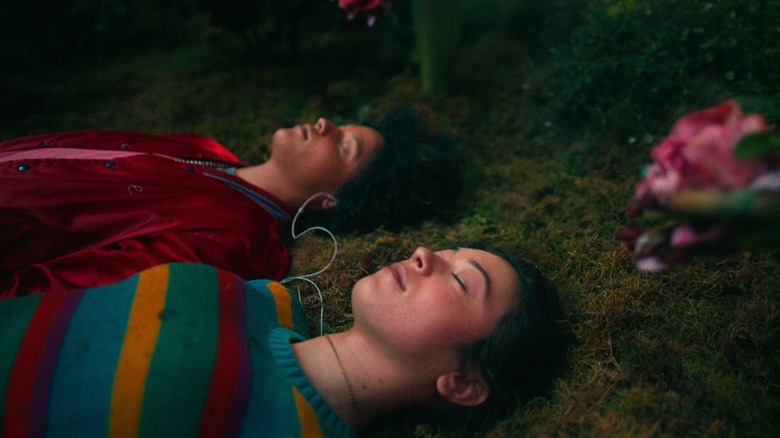
Not to put on my critical hat, but something that runs through a lot of your work is this balance between being very emotionally raw and being whimsical at the same time. I'm thinking of your short film "Me, the Terrible," which I think is completely adorable. I feel like this might also be said of something like "Shirley," where she's very gruff, but also incredibly funny in a sardonic way. How do you strike that balance between trying to be really raw and trying to be upbeat at the same time?
Yeah. I think it's interesting, I remember Martin Scorsese, who executive produced "Shirley," -- which was such a gift, oh my God -- I was talking to him about the very beginning of "Alice Doesn't Live Here Anymore." I was just saying how much I loved that contradiction: It starts in this fairy tale-ish world and signals that it's a fairy tale-ish world, but then the mom just comes out and screams and curses at the child who's running around. And you're like, "Oh, okay. That's a contradiction. That's not really what I think." And he said, "That's cinema, is contradiction. You have to have those. The contradiction is what makes the good cinema." And I was like, "Oh yeah."
Martin Scorsese has clearly aced contradictions, but I don't think it would be a very good movie or worth watching if it was just one or the other. I don't think we'd have a movie, that's what makes the movie so special. And I'm sure there are many movies that are maybe more tonally a smaller lane, which is maybe that can be very successful, too. But I actually got into movies because I was obsessed with children's movies, and what I love about kids movies is that they deal with really big, profound, sensitive issues and also are so playful and are really, really entertaining. So it was fun to just get to dig into that realm a little bit and make something that was a little bit more playful, entertaining, and also dealing with something to me was very needy material, like life and death.
High School Cliche And Nature
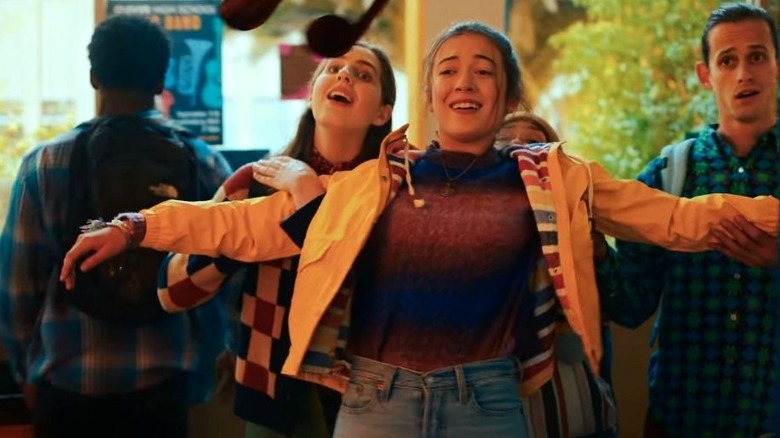
I appreciate that you were able to depict the sophisticated contradictions of Lennie. There are many pieces of media that seem to come at teenagers as immature, but I find they're very sophisticated people.
Yeah. Oh well, that's interesting. Yeah. In some ways I feel like it's also in relief to, for instance, a show like "Euphoria," where teenagers are so complicated and what they're going through is so adult. It was in a way, I always thought of our film as a more innocent view of childhood, or a little bit more of a '90s version of childhood, where you could be a teenager and you are still sort of a kid, you're still entering the world and you have maybe a vision for how things are, that then it turns out to be it's really way more complex.
So it was nice to put that into the world, too. Because there's already so much to deal with. Lennie has this very deep, intense, like this life or death that she's processing and also is falling in love and all that. But it's interesting, I'm just thinking about what you're asking about. It's interesting to hear you say, you think that teenagers are portrayed as simple. What movies are you thinking about when you say that?
I've seen far too many comedy films about teenagers going through their school experience and their defining characteristic is they just don't like school, or there are a lot of cliches about pressure from the cliques you might see in high school and they all fall into a lot of cliches.
Oh yes. Oh, I see what you're saying. Yes, yes, yes. Exactly, the cliches of high school. And you're right, and those are actually often present even in these darker, brooding, complicated things. That was also what I loved about this movie. Jandy wrote this world that you're like, "What a cool world to live in." She's in the Redwood Forest, that's where she goes to high school, already you're like, "God, I wish I had gone to high school in the Redwood Forest, I would've had such a better time." I probably would've just, if you're really upset, you just go hang out with a tree, and the tree really understands you, they don't judge you. They just sit there. They're like, "I've been through it, too. You know, I had some forest fires, somebody had to write their name on my favorite piece of bark and I lost that bark."
I do think that nature really holds a complexity of experience, and I think that's one of the magical aspects to this film that Jandy wrote into the script, is just the setting gives both complexity and innocence. I do feel like the forest -- I think we all feel this -- if you go to the ocean, you go to the forest, and there's this [breath] that comes out of you, which is it takes the dark smoke of our anxiety and transforms it. It's really interesting also that she meets Joe in the forest and he takes her dark anxiety and transforms it a little bit too, sometimes. Yeah.
The Production And Optimism
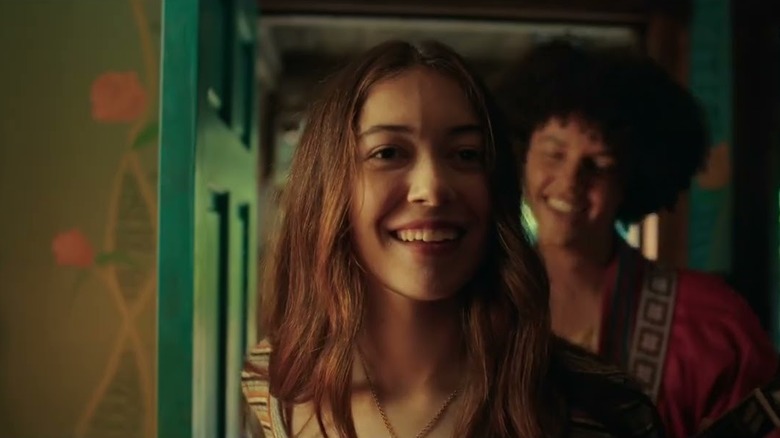
I grew up in Los Angeles, I'm a city kid. So films that are set in these wood-bound artists' enclaves are almost wish fulfillment fantasies in a certain way.
Yes, absolutely. I'm from Texas, so yes. Completely, I would've died to have grown up in a wood-bound area. Yes.
I was looking up the history of this movie and I'd read some things that it was in development for many, many years. How much of this was already worked upon, how much was laid down before you got to come on?
Yeah. Well, the script had a lot of work done to it. So our producers, Denise Di Novi, had this script at Time Warner, and they had done some work with it and I don't know what that was. I think [for] probably two years or something like that. But then it was in turnaround, I think the rights had lapsed there, so then when I got to read it, I was like, "This is so good. This is so good. Please, I want to work on this movie so much." I convinced Jandy to let me make it. Then we reconnected with Denise and her producer, Margaret, and then I brought on Allison Carter, who I love, who I've worked with before. Then we went out and raised some money. And so I was so grateful and excited and it just definitely grabbed me immediately.
But a lot of that work had happened before I came on board. And then I think I've worked on this -- for four or five years, I've been trying to make this movie, and about two and a half years ago, I almost made it then. But then we had to push because I had a baby and then we shot the film in the fall of 2020. But yeah, it's been in the works, so I'm so happy that it's finally out in the world.
Babe And Dostoyevsky
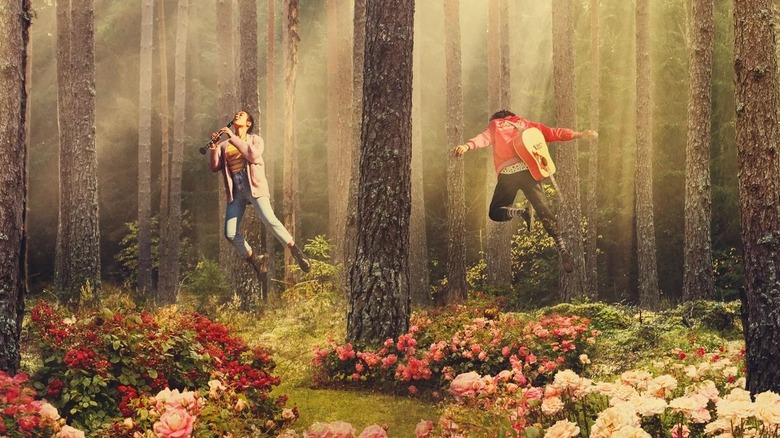
I love your optimism, and how, in this film -- and in several others of yours -- there's a sense things are going to turn out okay. Even in some of your more raw, or aggressive films, there is a stranger, pervasive feeling that everything's going to be okay. This is a broad question, but how do you maintain that, how do you find the hope in a lot of these stories? Even in the crazy ending of "Thou Wast Mild and Lovely?"
Yeah, yeah. Yeah. There is an ending with an acceptance, you're right, I think, in all of the movies. But "Thous Wast Mild and Lovely" has the craziest ending. It is such a crazy ending. Oh my God. Anyway, I had a lot of fun. It's funny because I think of all of the other films that I've made before this, I think they're pretty dark. They're dark in a sometimes very playful way. I think "Mild and Lovely's" playful. I think "Madeline's Madeline" is very playful. But they're also intense. They're intense experiences of watching.
I really love films that have ambiguous endings. I'm really into giving an audience an experience where they leave the theater and the film is not totally complete, and they have to complete it as they continue with their day. I think I've done that with almost all of my films. This one probably the least so -- this one has a completeness of experience, especially because there's voiceover all over the ending. Normally I would just not tell the audience anything that's happening, but that was in the script.
We're saying balance is so important for making art. I love epic novels. I love "One Hundred Years of Solitude" and "The Brothers Karamazov." There's a lot of lightness and also really intense darkness in those worlds. And I think an experience is not complete without both. So in these films that I've made, which are maybe darker, there is some degree of the lightness because it doesn't feel to me like it would be a complete experience without that. Some are calling it optimism, I guess. In this one, I think obviously it's a film about grief, but it's also really held in this very colorful world that is asking Lennie to love it, and herself again, basically. So, I don't know. My favorite movie of all time is "Babe," about the little pig. So that maybe tells you something about my aesthetic and why optimism is maybe in some degree in all of my films.
I love that you mentioned "Babe" and Dostoevsky in the same explanation. That's beautiful. Also "One Hundred Years of Solitude." Please tell me you're going to make a film of that novel.
Oh, I would feel so blasphemous. I feel like you have to leave that to a Latin American filmmaker. I would just never be allowed to touch that. I'm so obsessed, though. Yeah, maybe I could adapt some part of it, but I think especially now, there's some genius, I'm sure that somebody is already on that. Alfonso Cuarón -- somebody's got to be making it. I'm sure that Netflix has the rights. But it does feel like it's such a great novel. It's hard to do anything with that and almost too close to my heart, I don't know if you'd want to turn it into a movie. But that's probably the best thing I've ever read. I was a literature major, so I have a lot of favorite books.
Bisexuality And What They Don't Teach You In Sunday School
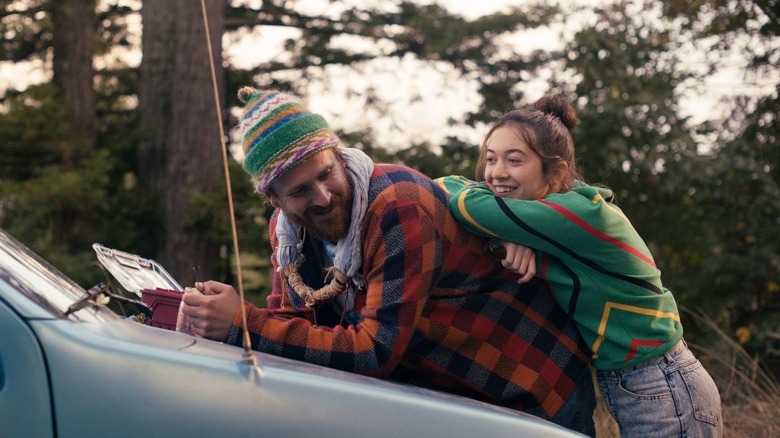
I wanted to ask you about a documentary you made in 2008 called "Bi the Way." Because I didn't get to see it, I can't really comment on what you said in it, but I can say that a lot of talk about bisexuality and sexuality in general has changed a lot since 2008. Is a sequel is possible, or a follow-up of some kind is in the works?
"Bi the Way" was probably ... I think there's two ways that I've learned the most in doing. One of them was "Bi the Way," and one of them was "Madeline's Madeline." In "Madeline's Madeline," the process was so hard and also wonderful that I grew a lot and I learned a lot and I just feel like I was a different person after I made that movie, and I knew things that I never would've known if I hadn't. Same with "Bi the Way," but "Bi the Way" was a pretty grueling personal, miserable -- I had one personal relationship that was entwined with that movie that was really bad. So, I don't ever want to revisit that. I'm so glad no one can ever see it, it was so painful.
But in a lot of ways really important, it was reckoning, I grew up in Texas, and it was like a real reckoning with my Texas upbringing. We were going around interviewing sex therapists and sociologists, and we interviewed this couple who'd written this book called "The Myth of Monogamy," and I was just like, "Oh my God, this is not what they teach you in Sunday school." But also it was such a beautiful way to embrace the complexity of sexuality, and the complexity that everyone is on a spectrum and it does feel like now 12, 13 years later, there's so much more embrace of the fluidity of sexuality.
But at the time, I think there was a pretty good embrace of bisexuality for women, but I would say there was still so much ... what do they call it? Not stereotype, but like a prejudice. There's sort of a prejudice around it for men, I think. Now I hope that has transformed as well. I think that there's much more space for fluidity and men's sexuality as well. There's definitely a lot more examples in the media of men who are a bit more fluid.
"The Sky is Everywhere" debuts on Apple TV+ on February 11, 2022.
Read this next: The 19 Greatest Movie Couples Of All Time Ranked
The post Josephine Decker on The Sky is Everywhere, Grief, and Her All-Time Favorite Movie [Interview] appeared first on /Film.
0 Commentaires